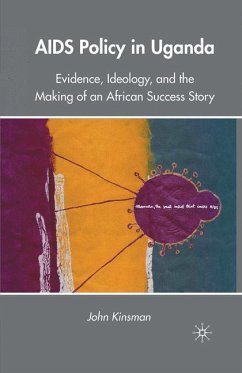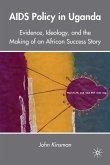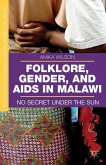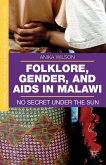This book presents a history of AIDS control in Uganda, from the start of the epidemic in the early 1980s up until 2005. Uganda is well known internationally as an AIDS 'success story', both for its bringing down HIV incidence and prevalence over the 1990s, and for its innovative approach to scaling up the provision of antiretroviral therapy.
'Groundbreaking. Intrigued by what could actually have guided AIDS control in Uganda, the author investigated a flagship research which was set up in the early days of the epidemic to guide policy. The lesson the book teaches us all is that for a socially and sexually determined epidemic such as HIV/AIDS, the linkages in collaboration, cooperation and investment of resources must be multilevel: at global, institutional, patient-doctor and individual patient levels.' Sam Agatre Okuonzi, The Independent
'AIDS Policy in Uganda is well written, about an important topic, and contains observations and criticisms that deserve broad discussion.' American Anthropologist
'An accessible and compelling story of evidence and AIDS . . . Beautifully written and argued.' Gill Walt, Professor Emeritus of International Health Policy, London School of Hygiene and Tropical Medicine
'John Kinsman brings a health educator's and anthropologist's perspective to examining the AIDS policy process in Uganda. His unique insights make fascinating reading and suggest how important it is for policy advisers to understand the context, influences, and personalities of decision makers in addition to the scientific factors. This very readable book has much to teach those who advise on health policy issues.' Dr Richard Laing, Department of Essential Medicines and Pharmaceutical Policies, World Health Organization, Geneva, Switzerland
'This book is written with great sensibility to Ugandan culture. Using a political-economy approach, it shows that HIV/AIDS in Uganda is not purely a medical problem, but one that is anchored in multiple economic and structural contexts, globally, nationally and locally. The book will appeal to a wide audience and make an important contribution to the field of medical anthropology, especially as it pertains to international health policy, the social history of AIDS, and social epidemiology.' Professor Charles B. Rwabukwali, Department of Sociology, Makerere University, Kampala, Uganda
'AIDS Policy in Uganda is well written, about an important topic, and contains observations and criticisms that deserve broad discussion.' American Anthropologist
'An accessible and compelling story of evidence and AIDS . . . Beautifully written and argued.' Gill Walt, Professor Emeritus of International Health Policy, London School of Hygiene and Tropical Medicine
'John Kinsman brings a health educator's and anthropologist's perspective to examining the AIDS policy process in Uganda. His unique insights make fascinating reading and suggest how important it is for policy advisers to understand the context, influences, and personalities of decision makers in addition to the scientific factors. This very readable book has much to teach those who advise on health policy issues.' Dr Richard Laing, Department of Essential Medicines and Pharmaceutical Policies, World Health Organization, Geneva, Switzerland
'This book is written with great sensibility to Ugandan culture. Using a political-economy approach, it shows that HIV/AIDS in Uganda is not purely a medical problem, but one that is anchored in multiple economic and structural contexts, globally, nationally and locally. The book will appeal to a wide audience and make an important contribution to the field of medical anthropology, especially as it pertains to international health policy, the social history of AIDS, and social epidemiology.' Professor Charles B. Rwabukwali, Department of Sociology, Makerere University, Kampala, Uganda








